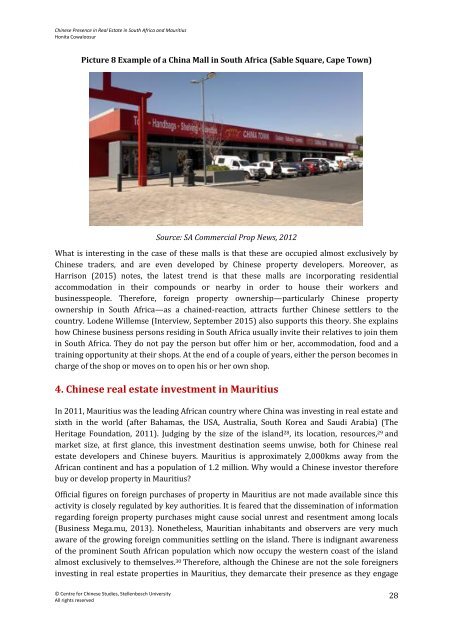and Mauritius
CCS_Research-Report_Chinese_Presence_South-Africa_Mauritius_Honita_Cowaloosur_2016
CCS_Research-Report_Chinese_Presence_South-Africa_Mauritius_Honita_Cowaloosur_2016
Create successful ePaper yourself
Turn your PDF publications into a flip-book with our unique Google optimized e-Paper software.
Chinese Presence in Real Estate in South Africa <strong>and</strong> <strong>Mauritius</strong><br />
Honita Cowaloosur<br />
Picture 8 Example of a China Mall in South Africa (Sable Square, Cape Town)<br />
Source: SA Commercial Prop News, 2012<br />
What is interesting in the case of these malls is that these are occupied almost exclusively by<br />
Chinese traders, <strong>and</strong> are even developed by Chinese property developers. Moreover, as<br />
Harrison (2015) notes, the latest trend is that these malls are incorporating residential<br />
accommodation in their compounds or nearby in order to house their workers <strong>and</strong><br />
businesspeople. Therefore, foreign property ownership—particularly Chinese property<br />
ownership in South Africa—as a chained-reaction, attracts further Chinese settlers to the<br />
country. Lodene Willemse (Interview, September 2015) also supports this theory. She explains<br />
how Chinese business persons residing in South Africa usually invite their relatives to join them<br />
in South Africa. They do not pay the person but offer him or her, accommodation, food <strong>and</strong> a<br />
training opportunity at their shops. At the end of a couple of years, either the person becomes in<br />
charge of the shop or moves on to open his or her own shop.<br />
4. Chinese real estate investment in <strong>Mauritius</strong><br />
In 2011, <strong>Mauritius</strong> was the leading African country where China was investing in real estate <strong>and</strong><br />
sixth in the world (after Bahamas, the USA, Australia, South Korea <strong>and</strong> Saudi Arabia) (The<br />
Heritage Foundation, 2011). Judging by the size of the isl<strong>and</strong> 28 , its location, resources, 29 <strong>and</strong><br />
market size, at first glance, this investment destination seems unwise, both for Chinese real<br />
estate developers <strong>and</strong> Chinese buyers. <strong>Mauritius</strong> is approximately 2,000kms away from the<br />
African continent <strong>and</strong> has a population of 1.2 million. Why would a Chinese investor therefore<br />
buy or develop property in <strong>Mauritius</strong>?<br />
Official figures on foreign purchases of property in <strong>Mauritius</strong> are not made available since this<br />
activity is closely regulated by key authorities. It is feared that the dissemination of information<br />
regarding foreign property purchases might cause social unrest <strong>and</strong> resentment among locals<br />
(Business Mega.mu, 2013). Nonetheless, Mauritian inhabitants <strong>and</strong> observers are very much<br />
aware of the growing foreign communities settling on the isl<strong>and</strong>. There is indignant awareness<br />
of the prominent South African population which now occupy the western coast of the isl<strong>and</strong><br />
almost exclusively to themselves. 30 Therefore, although the Chinese are not the sole foreigners<br />
investing in real estate properties in <strong>Mauritius</strong>, they demarcate their presence as they engage<br />
© Centre for Chinese Studies, Stellenbosch University<br />
All rights reserved<br />
28


